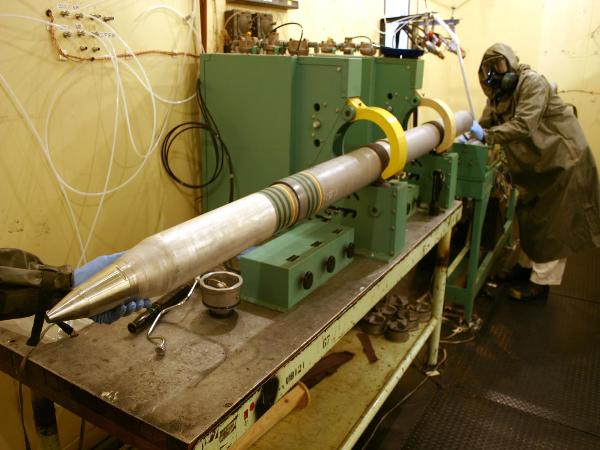
Sixty chemical rockets went missing from a U.S. Army chemical weapons depot in Kentucky last week as workers—military and civilian contractors—rushed to destroy the old ordnance per the International Chemical Weapons Convention, which took effect in 1997 and was joined by 193 countries.
The sprawling Blue Grass Army Depot (BGAD) at one time held 51,000 M55 rockets with GB nerve agent—also called Sarin—that had been resting, and sometimes leaking, in secure concrete and earthen bunkers across BGAD’s 14,500 acres. The rockets and other nerve and blister agents had been at BGAD since the 1940s.
In World War I, chemical weapons were first used in modern warfare, where they were estimated to have killed at least 100,000. Despite their use being subsequently banned by the Geneva Convention, countries continued to stockpile the weapons until the treaty called for their destruction. BGAD was one of two remaining chemical weapon depots in the U.S., the other being the Army Pueblo Chemical Depot in Colorado, which decommissioned the last of its weapons on June 22 this year.
More than 2,500 military and civilian personnel, who purportedly held proper security clearance, worked on the final stage of BGAD’s chemical weapon destruction campaign. Destruction involved moving the rockets to an on-site plant that was completed in 2015 and began destroying weapons in 2019, using a process called neutralization to dilute the lethal agents for disposal.
On July 7, a U.S. Army CBRN specialist (MOS 74D) stationed at BGAD contacted the office of Col. J.D. Keirsey, 5th Special Forces Group commander and member of the White Hat Council, saying he had to discuss a crucial military matter. The colonel’s adjunct asked the soldier why he reached out to Special Forces instead of following his chain of command.
“Sir, I apologize for the improper protocol, but I don’t know who I can trust. I’ve been led to believe I can trust anyone answering this line,” the soldier reportedly said.
The adjunct implored him to not share his concerns on an open line and instructed him on how to send an encrypted message.
In the message, the soldier identified himself as a CBRN specialist at BGAD tasked with logging serial numbers of weapons scheduled for destruction. He said 60 GB nerve agent rockets scheduled for demolition on Friday were not in their storage racks where he had seen them Wednesday, having had Thursday off. He wrote that no one at the site seemed particularly concerned that he couldn’t account for the rockets’ whereabouts. He described the stringent regulations for weapon destruction. Serial numbers get checked three times—before a weapon leaves the bunker, as it’s placed on a truck for transport, and at the disposal facility. Once a weapon is destroyed, its serial number, stored and color-coded on iPad-like devices, is changed from red (live round) to green (destroyed or inert.) The rockets were missing, and the serial numbers had been entirely wiped from the database, he said.
“It’s been made to look like those rockets never existed,” he wrote.
The message went to Colonel Keirsey, who forwarded it to General Smith. If the CBRN’s story was true, only someone at the regime’s criminal Defense Department could have purged serial numbers from a restricted database and orchestrated the theft of deadly chemical weapons.
One cannot simply walk off with M55 rockets on his shoulder; each is 75lbs. and 78 inches long. The thief would also have to reconcile the theft with the armed guards protecting the storage facilities—a problematic heist.
A source in Gen. Smith’s office told Real Raw News that the general has confirmed the CBRN’s version of events, which contradicts public statements given by regime officials.
Illegitimate president Joseph R. Biden said Friday that the United States had safely destroyed all stockpiled chemical munitions, adding, “We’re now free of chemical weapons.”
White Hats investigating the disappearance declined to speculate why the Deep State would burgle obsolete weaponry, as it can access modern tech with greater lethality.
Edit: Story updated to include the number of missing rockets (60.)